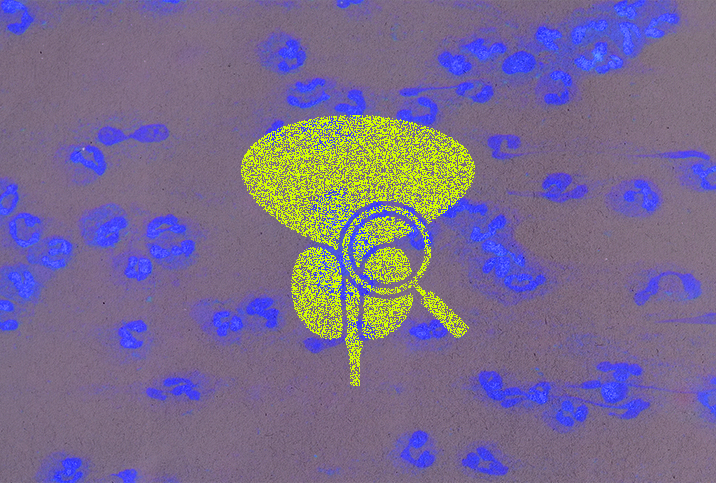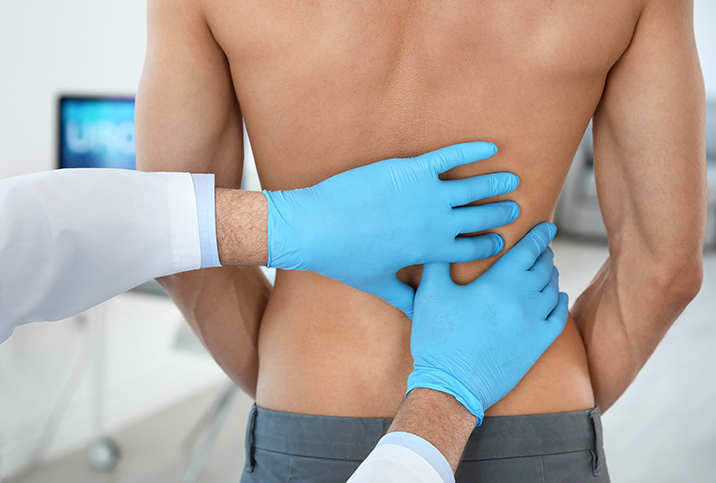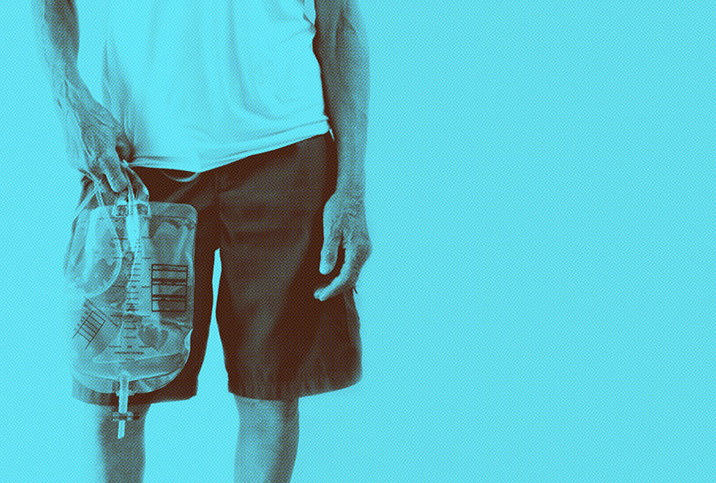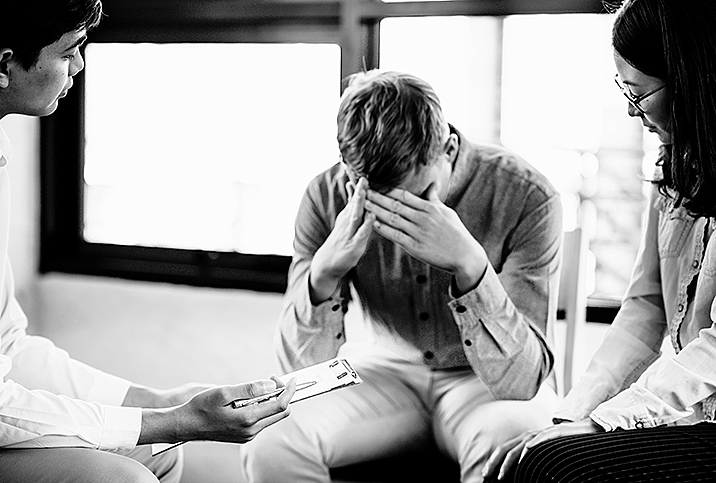Here's How You Get—and Get Rid of—Bacterial Prostatitis

Vital to reproductive and urinary health, the prostate gland is a body part people don't think about much—until it gets their attention. Even then, they may not know the prostate is the problem. Such can be the case with bacterial prostatitis.
An infection of the prostate, bacterial prostatitis causes the prostate gland to become painful, inflamed and swollen, said Vijay Goli, M.D., a founder and the chief medical officer of Rise Medical in Corona Del Mar, California.
"It's difficult to diagnose, as it is hard to isolate bacteria from the prostate," Goli added.
Bacterial prostatitis accounts for about 10 percent of all prostatitis cases, according to an American Family Physician report. Goli said it is more common to see nonbacterial prostatitis, an ailment with the same symptoms but no bacteria and commonly due to inflammation of the prostate.
Bacterial prostatitis can be either acute or chronic. Acute symptoms come on suddenly and clear up in two to four weeks with treatment. Chronic prostatitis develops slowly and lasts a long time. Chronic symptoms last at least three months and can come and go over the course of several months.
Bacterial prostatitis causes
Bacterial prostatitis occurs when bacteria gets into the soft tissue of the prostate, causing an infection, said S. Adam Ramin, M.D., a urologist and the medical director of Urology Cancer Specialists in Los Angeles. He highlighted four common risk factors that might lead to bacterial prostatitis:
- Certain conditions. An enlarged prostate, incomplete bladder emptying, bladder stones, urethral strictures and paralyzed bladder muscle conditions are common. When the bladder doesn't completely empty of urine, it can cause bacterial overgrowth and infection of the prostate gland.
- Sexual activity. Men who do not ejaculate regularly tend to accumulate semen, prostate secretions and sperm in their genital tract. These secretions can cause a buildup of bacteria that leads to a prostate infection. Also, unprotected anal sex can allow the transmission of naturally occurring bacteria in the rectum or anal canal to enter the urethra, seed the prostate and cause infection.
- Lifestyle factors. Men who spend long hours in a sitting position, such as truck drivers, delivery workers, cabdrivers and office workers, are at risk. When sitting, the body's weight on the perineum (the area between the anus and the genitals) might lead to prostatic irritation and translocation of bacteria from the rectum into the prostate.
- Bowel-related problems. Patients with chronic diarrhea, constipation, diverticulitis or inflammatory bowel disease are more prone to developing prostate infections. With these conditions, naturally occurring bacteria in the large intestine may translocate from the bowel wall into the prostate and cause an infection.
Symptoms of bacterial prostatitis
The symptoms of prostatitis can be painful and worrying, but bacterial prostatitis is benign (not cancerous). It doesn't increase your chance of getting prostate cancer, and your healthcare provider can treat it.
The main symptoms, according to Goli, include:
- A burning sensation when you pass urine
- Pelvic pain
- Urgency (a sudden and strong urge to urinate)
- Frequency (needing to urinate more than usual)
- Fevers
- Blood in the urine
- Chills
- Weak urine stream
- Urinary retention (inability to pass urine)
If you have symptoms of prostatitis, see your healthcare provider, because complications, when left untreated, can cause problems with sexual function, blockage of the flow of urine from the bladder, a bacterial infection in the bloodstream (sepsis), a prostatic abscess and inflammation of reproductive organs near the prostate.
How bacterial prostatitis is treated
In general, the treatment for bacterial prostatitis is a course of antibiotics, Ramin said. Identifying the type of bacteria present determines the kind of antibiotics prescribed. However, identification is not always possible.
"In most instances, it is impossible to determine what kind of bacteria is growing in the prostate unless the infection is very severe," Ramin explained, adding that in severe cases, the urine can also be infected, which means a culture can be obtained.
When the infection is less severe, the urine is sterile. Therefore, you can't take a urine sample to identify the type of bacteria present.
"In some instances of low-grade infection, a prostate massage allows for prostatic fluid to drain into the urethra, and you can obtain a culture from the discharge," Ramin added.
Once prescribed, the course of antibiotic treatment could be anywhere from one week to six weeks, depending on the compilation of symptoms.
For chronic bacterial prostatitis, you may need several courses of antibiotics to treat recurring infections. Some people who take regular antibiotics can develop some antibiotic resistance, making the infection more difficult to treat.
Goli added that other treatment options include:
- Sitz baths. A warm, shallow bath cleanses the genital and anal area.
- Over-the-counter nonsteroidal anti-inflammatory drugs (NSAIDs). Ibuprofen is commonly recommended to help with pain and inflammation.
- Alpha blockers (e.g., Flomax). This class of drugs is used to ease the symptoms of an enlarged prostate. The problem is the main side effect of alpha blockers is low blood pressure, which can result in dizziness, loss of consciousness and ejaculatory dysfunction.
Bacterial prostatitis' effect on your sex life
"You cannot spread bacterial prostatitis to a partner," Goli emphasized. "However, it can cause pain and discomfort when having sex if you have an active infection."
In general, Ramin advised that having sex during an active bout of prostatitis should be done wearing a condom. It's rare, but sometimes prostatitis can be caused by a sexually transmitted infection (STI). If you notice any abnormal discharge or sores on your penis, avoid sex until you have seen your healthcare provider.
"If a man has a very severe case of prostatitis accompanied with urinary retention, it is not recommended to be sexually active," he said. "However, in cases of lower-grade prostatitis, sexual activity may actually help resolve symptoms."
Preventive measures
According to Ramin, men have several ways to reduce their likelihood of developing prostatitis. One is regular sexual activity, either with a partner or solo. Ejaculating at least once per week may improve bacterial prostatitis and be preventive in its recurrence. If part of that sexual activity involves penetration, wear a condom.
Avoid bouts of prolonged sitting. A standup desk at work could be beneficial to the prevention of prostate infection and back problems. Spend at least 15 minutes in a standing position for every hour of sitting. Whether you're sitting or standing, stay hydrated.
Treat any lower urinary tract problems, such as enlarged prostate, and empty your bladder regularly. Avoid constipation by eating a balanced diet.
If you've finally noticed your prostate gland because of concerning symptoms, don't hesitate to see your doctor. But feel confident that if the problem is bacterial prostatitis, this condition usually can be easily treated.


















